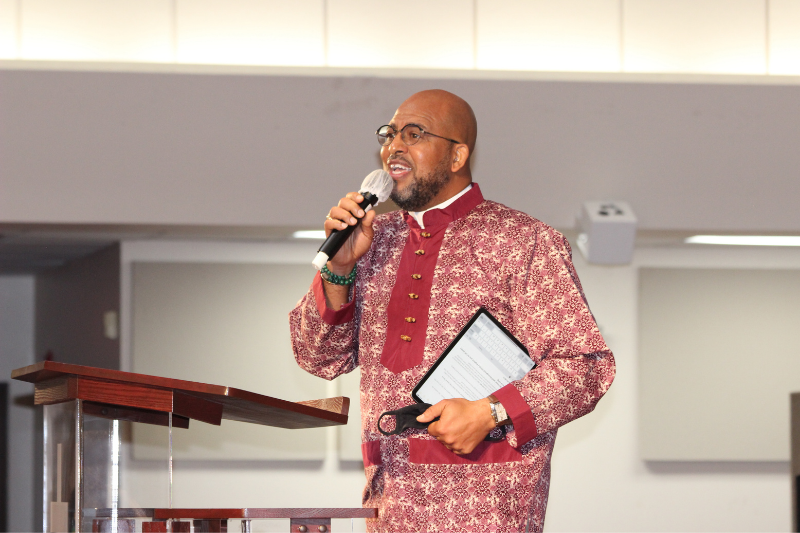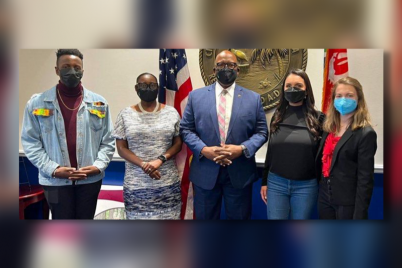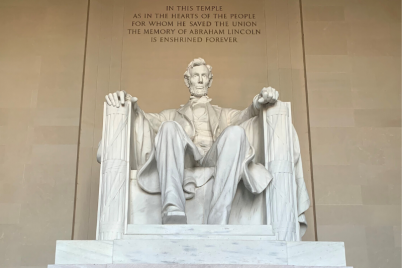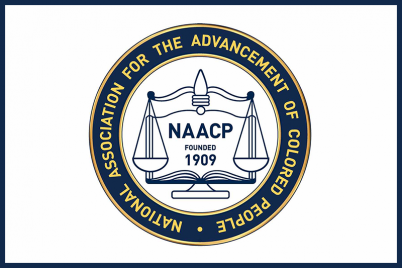Rev. Kenny Irby, senior pastor of Bethel AME Church, delivered the keynote address at the 2022 Emancipation Proclamation Service, held at Mt. Zion Progressive Missionary Baptist Church on Jan. 1.
BY FRANK DROUZAS, Staff Writer
ST. PETERSBURG — When President Abraham Lincoln issued the Emancipation Proclamation on Jan. 1, 1863, it not only delivered certain enslaved people freedom from bondage but also forever changed the lives of Black Americans for generations to come.
To celebrate the historic event, the St. Petersburg Branch of the NAACP brought the community together for its annual Emancipation Proclamation Service, held at Mt. Zion Progressive Missionary Baptist Church on Jan. 1.
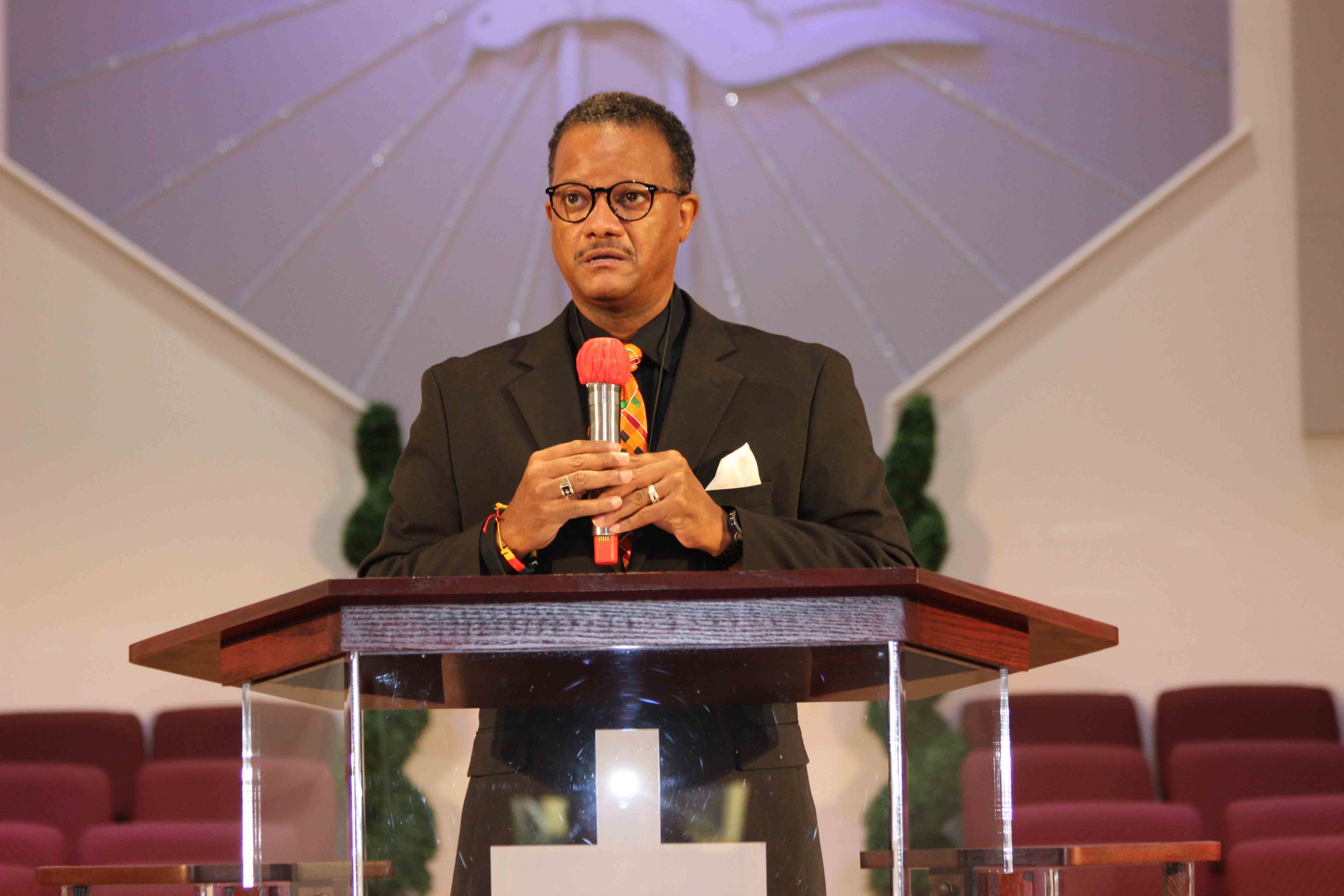
‘The Confederates, they forced Black people to fight against the North,’ said Pastor Robert Vinson of Faith Memorial Missionary Baptist Church. ‘They forced us to fight to keep ourselves enslaved!’
Trenia Cox, first vice president of the St. Pete branch, served as the event’s mistress of ceremony.
“It’s important that you understand that the responsibility for sharing our history rests with us, our families, our faith-based institutions,” she said.
One of the things Esther Matthews, president of the St. Petersburg Branch NAACP, wanted to focus on when taking office last year was connectivity.
“Three hundred sixty-five plus now, days later, we can stand together connected in celebration,” she said. “We are truly on the way.”
She said that the branch stayed true to the vision of promoting impact and change through intentional collaboration and working hard to increase membership. Other goals of last year the branch accomplished were remaining engaged in racial and equity-focused work, working with Pinellas County School Board to address all disparities, establishing open communication with law enforcement, and ensuring that the branch leadership has the ability to support the community in need.
“We also remained consistent and steadfast in the goals of 2021,” she said, “and have stabilized solid organizational relationships. But 2022 is the year of harvest.”
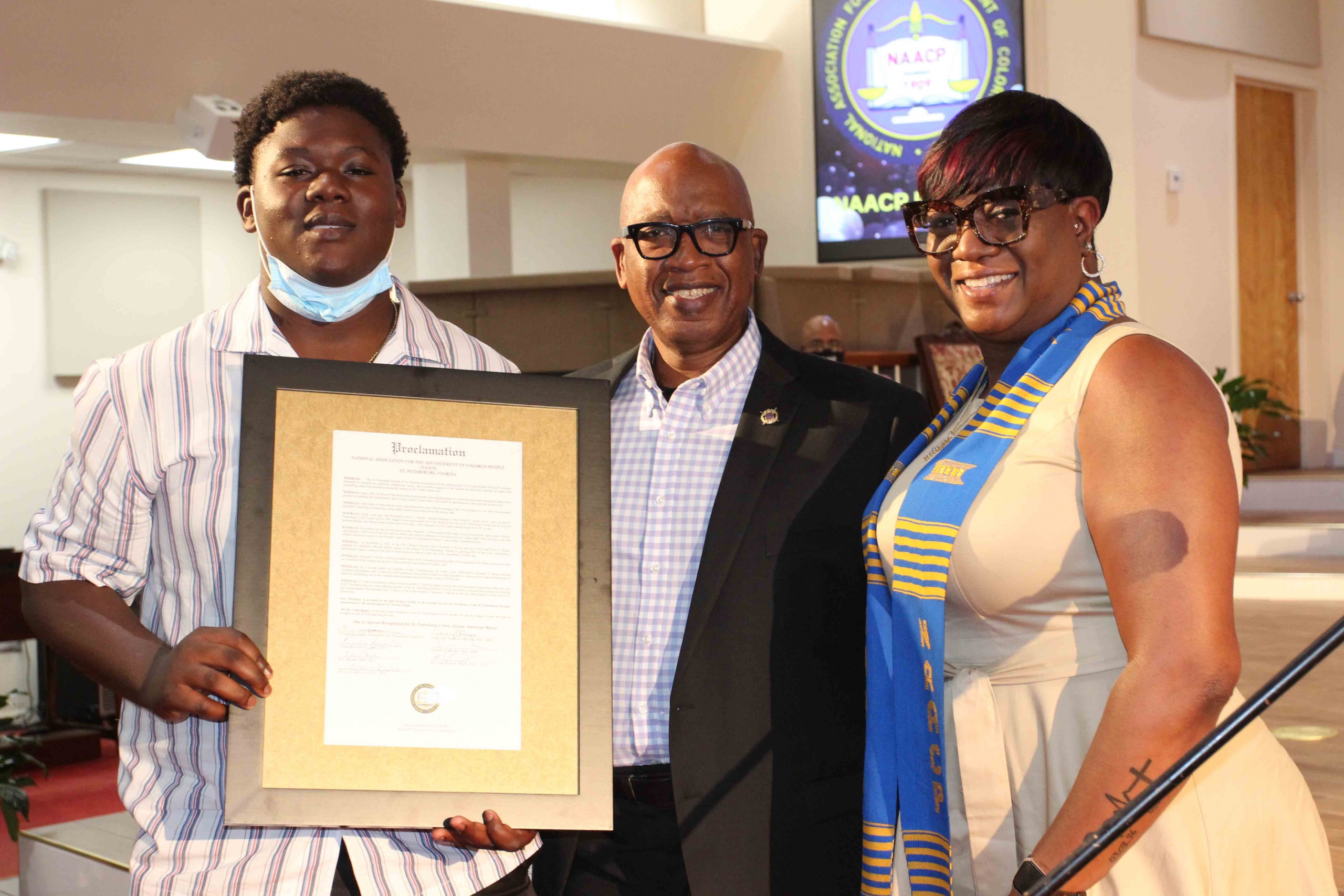
The St. Petersburg Branch of the NAACP brought the community together for its annual Emancipation Proclamation Service, held at Mt. Zion Progressive Missionary Baptist Church on Jan. 1. Left, NAACP St. Petersburg Youth Council member Marcus Calvin, Mayor Ken Welch, and Esther Matthews, president, St. Petersburg Branch NAACP
For the new year, Matthews said she wants to focus on three “Ms.” She will strive to mobilize the community to feel empowered “and have their voices heard intentionally.” She also wants to motivate the community to engage in the local NAACP branch.
“Our ability to enact change comes from the work of the community’s involvement in the branch committees,” she said.
Finally, the president wants to maximize the effectiveness and stability of the committees as they move to do the branch’s work. She urged everyone to remain focused on race and economic equity, public health and safety, environmental resilience, voting rights, political representation, and affordable housing.
“We must move as one to ensure progress,” said Matthews, who is beginning her second year as branch president.
Matthews bestowed a special recognition upon Ken Welch in honor of him being the first African American to be elected mayor in the city’s history.
Welch, a long-standing member of the St. Pete NAACP, noted that his great-grandfather, Ambrose Welch, was born over a decade after the Emancipation Proclamation.
“We have a legacy to uphold,” he said, “from all those who sacrificed before us.”
He thanked the NAACP for supporting his youth conferences and underscored his vision of equity for the city.
“Just as hard as we fought to win this election, we’re going to have to fight to bring real equity,” Welch said.
In delivering his keynote address, Rev. Kenny Irby, senior pastor of Bethel AME Church, extolled the virtues of the power of song, specifically underscoring the historical significance of the African-American anthem, “Lift Every Voice and Sing.” The song was written as a poem by the NAACP executive secretary and writer James Weldon Johnson.
“On this journey to freedom and equity … we’ve got to sing,” he said. “As we battle against injustice and inequity, we must trust God.”
Even as Black Lives Matter protestors marched and chanted “Hands up, don’t shoot!” they clapped and did it rhythmically, he said. Irby, who orchestrated the city’s Not My Son campaign and launched the Cohort of Champions, said that we must hold leadership accountable and “do mercy in the quest for justice.”
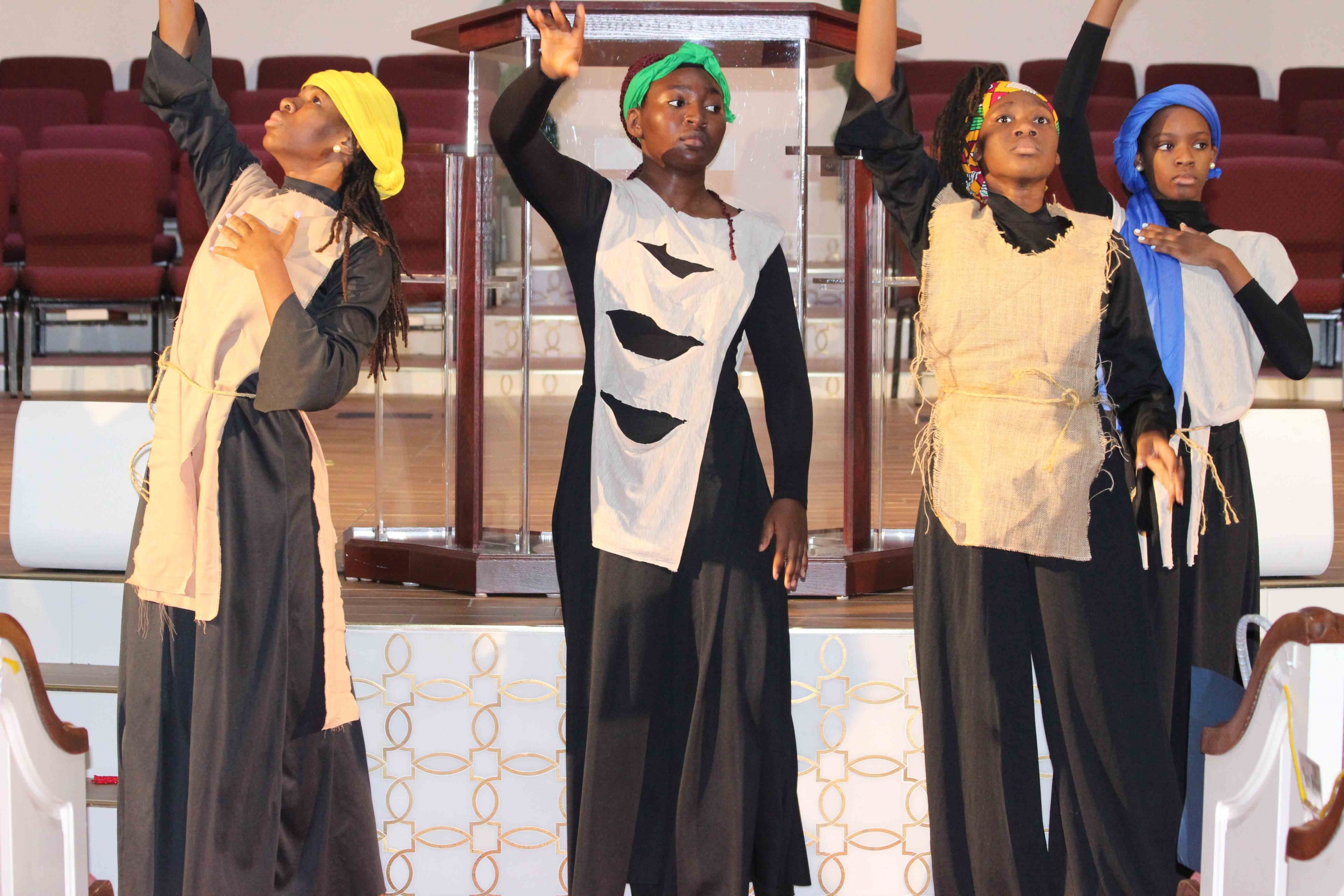
Mt. Zion Progressive Pure Expressions dance ministry
Pastor Robert Vinson of Faith Memorial Missionary Baptist Church offered some historical context, explaining that though the overt reasons of the Civil War may have been about the rights of states and their economies, it was really about slavery, and Lincoln sought an end to it.
“Technically, the Emancipation was not a force of law; it was really a moral direction. A military, moral direction that was given,” he explained.
Due to a dearth of volunteer soldiers, abolitionists like Frederick Douglass urged Lincoln to deploy Black men to fight for the Union, despite a 1792 law that prohibited Black people from bearing arms. But Vinson pointed out that the enslaved were forced to fight on behalf of the Confederacy in the South.
“The Confederates, they forced Black people to fight against the North,” he said. “They forced us to fight to keep ourselves enslaved!”
After the bloody Battle of Antietam in Sept. 1862, Lincoln warned the South: either stop the rebellion against the Union or all the slaves will have their freedom. The war waged on, and the signing of the emancipation Proclamation inevitably ensued. Though most of the enslaved were officially freed on that first day of the new year, the border states were allowed to keep human bondage, as those states were loyal to the Union.
“Only the states that had to be brought back to the Union through military conquest needed to free their slaves,” the pastor explained.
The Union recruited groups of escaped slaves to fight against the Confederacy, and such “self-liberated Black people” helped win the fight against the South and preserve the Union.
“There were reports of over 30,000 Black volunteers but over 130,000 self-liberated Black people from the southern states that were determined to help this victory over the South,” he said.
Following emancipation, Black people in the South remained extremely poor and labored in appalling conditions on land they rented. They were technically free, but their environment was indistinguishable from slavery.
“The residue from slavery remained as we were imprisoned psychologically,” he said.
Pastor Jana Hall-Perkins of McCabe United Methodist Church talked about the variety of emotions that the enslaved must have experienced when finally granted their long-sought-after freedom. Anger that it took so long, frustrated at the seeming “impression” of freedom –“but would freedom be the actual reality?”
Some were terrified at not knowing what the future held for them and feared that they would go from one place of bondage to another.
Yet many rejoiced — former slaves interviewed almost a century ago recalled that they rang bells, blew horns, and “shouted like they were crazy,” Hall Perkins said. One formerly enslaved individual recalled buying a rope, tearing it into little segments before distributing the pieces to others, saying, “When you look at this rope, I want you to remember that you were once in bondage, but now you are free!”
Rev. Louis Murphy, senior pastor of Mt. Zion Progressive Missionary Baptist Church, talked about the history of racism that’s “embedded in this nation” and the work that is yet to be done.
“Even though we can sit on green benches and go to water fountains and baseball parks and all of that,” he said, “but it is woven in the fabric to exclude us and to continue to use our natural resources, our intellectual resources, our physical resources for their gain.”
Murphy recollected a recent trip to Ghana where he visited Cape Coast Castle, a structure where they housed the enslaved before they were to be shipped across the Atlantic. He said the white Christian men were on the top floor, singing praises to God while their captives were suffering in the holds beneath them, shackled together in deplorable conditions. People must perceive what it means to be a Christian.
“How are you looking at these scriptures? What lenses are you looking at these scriptures through?” he said. “It’s critical.”
Murphy cautioned against people standing at opposite sides politically these days and urged them to open up and communicate, as the NAACP will line up with all organizations.
“Quit being so divisive!” he said. “We’re all in this together! And we may not agree on everything, but we can air out our differences.”
To reach Frank Drouzas, email fdrouzas@theweeklychallenger.com

